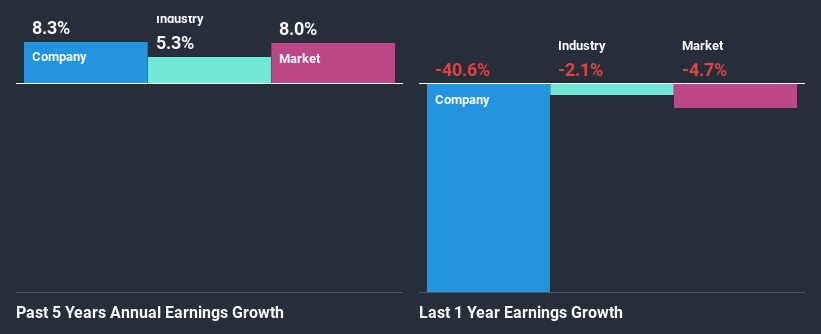- Hong Kong
- /
- Infrastructure
- /
- SEHK:1785
Should Weakness in Chengdu Expressway Co., Ltd.'s (HKG:1785) Stock Be Seen As A Sign That Market Will Correct The Share Price Given Decent Financials?
Chengdu Expressway (HKG:1785) has had a rough three months with its share price down 9.8%. However, stock prices are usually driven by a company’s financials over the long term, which in this case look pretty respectable. In this article, we decided to focus on Chengdu Expressway's ROE.
Return on equity or ROE is an important factor to be considered by a shareholder because it tells them how effectively their capital is being reinvested. In short, ROE shows the profit each dollar generates with respect to its shareholder investments.
See our latest analysis for Chengdu Expressway
How Is ROE Calculated?
The formula for ROE is:
Return on Equity = Net Profit (from continuing operations) ÷ Shareholders' Equity
So, based on the above formula, the ROE for Chengdu Expressway is:
8.0% = CN¥294m ÷ CN¥3.7b (Based on the trailing twelve months to June 2020).
The 'return' is the yearly profit. So, this means that for every HK$1 of its shareholder's investments, the company generates a profit of HK$0.08.
What Is The Relationship Between ROE And Earnings Growth?
We have already established that ROE serves as an efficient profit-generating gauge for a company's future earnings. We now need to evaluate how much profit the company reinvests or "retains" for future growth which then gives us an idea about the growth potential of the company. Generally speaking, other things being equal, firms with a high return on equity and profit retention, have a higher growth rate than firms that don’t share these attributes.
A Side By Side comparison of Chengdu Expressway's Earnings Growth And 8.0% ROE
On the face of it, Chengdu Expressway's ROE is not much to talk about. Although a closer study shows that the company's ROE is higher than the industry average of 5.6% which we definitely can't overlook. This certainly adds some context to Chengdu Expressway's moderate 8.3% net income growth seen over the past five years. That being said, the company does have a slightly low ROE to begin with, just that it is higher than the industry average. Therefore, the growth in earnings could also be the result of other factors. E.g the company has a low payout ratio or could belong to a high growth industry.
Next, on comparing with the industry net income growth, we found that Chengdu Expressway's growth is quite high when compared to the industry average growth of 5.3% in the same period, which is great to see.

The basis for attaching value to a company is, to a great extent, tied to its earnings growth. It’s important for an investor to know whether the market has priced in the company's expected earnings growth (or decline). This then helps them determine if the stock is placed for a bright or bleak future. One good indicator of expected earnings growth is the P/E ratio which determines the price the market is willing to pay for a stock based on its earnings prospects. So, you may want to check if Chengdu Expressway is trading on a high P/E or a low P/E, relative to its industry.
Is Chengdu Expressway Efficiently Re-investing Its Profits?
The high three-year median payout ratio of 55% (or a retention ratio of 45%) for Chengdu Expressway suggests that the company's growth wasn't really hampered despite it returning most of its income to its shareholders.
Along with seeing a growth in earnings, Chengdu Expressway only recently started paying dividends. Its quite possible that the company was looking to impress its shareholders.
Summary
In total, it does look like Chengdu Expressway has some positive aspects to its business. Namely, its significant earnings growth, to which its moderate rate of return likely contributed. While the company is paying out most of its earnings as dividends, it has been able to grow its earnings in spite of it, so that's probably a good sign. Until now, we have only just grazed the surface of the company's past performance by looking at the company's fundamentals. You can do your own research on Chengdu Expressway and see how it has performed in the past by looking at this FREE detailed graph of past earnings, revenue and cash flows.
If you decide to trade Chengdu Expressway, use the lowest-cost* platform that is rated #1 Overall by Barron’s, Interactive Brokers. Trade stocks, options, futures, forex, bonds and funds on 135 markets, all from a single integrated account. Promoted
New: AI Stock Screener & Alerts
Our new AI Stock Screener scans the market every day to uncover opportunities.
• Dividend Powerhouses (3%+ Yield)
• Undervalued Small Caps with Insider Buying
• High growth Tech and AI Companies
Or build your own from over 50 metrics.
This article by Simply Wall St is general in nature. It does not constitute a recommendation to buy or sell any stock, and does not take account of your objectives, or your financial situation. We aim to bring you long-term focused analysis driven by fundamental data. Note that our analysis may not factor in the latest price-sensitive company announcements or qualitative material. Simply Wall St has no position in any stocks mentioned.
*Interactive Brokers Rated Lowest Cost Broker by StockBrokers.com Annual Online Review 2020
Have feedback on this article? Concerned about the content? Get in touch with us directly. Alternatively, email editorial-team (at) simplywallst.com.
About SEHK:1785
Chengdu Expressway
Engages in the development, operation, and management of expressways located in Mainland China.
Excellent balance sheet and slightly overvalued.
Market Insights
Weekly Picks

THE KINGDOM OF BROWN GOODS: WHY MGPI IS BEING CRUSHED BY INVENTORY & PRIMED FOR RESURRECTION


Why Vertical Aerospace (NYSE: EVTL) is Worth Possibly Over 13x its Current Price


The Quiet Giant That Became AI’s Power Grid
Recently Updated Narratives


Mastersystem Infotama will achieve 18.9% revenue growth as fair value hits IDR1,650


Insiders Sell, Investors Watch: What’s Going On at PG?

Waiting for the Inevitable
Popular Narratives


MicroVision will explode future revenue by 380.37% with a vision towards success


NVDA: Expanding AI Demand Will Drive Major Data Center Investments Through 2026


Crazy Undervalued 42 Baggers Silver Play (Active & Running Mine)
Trending Discussion




